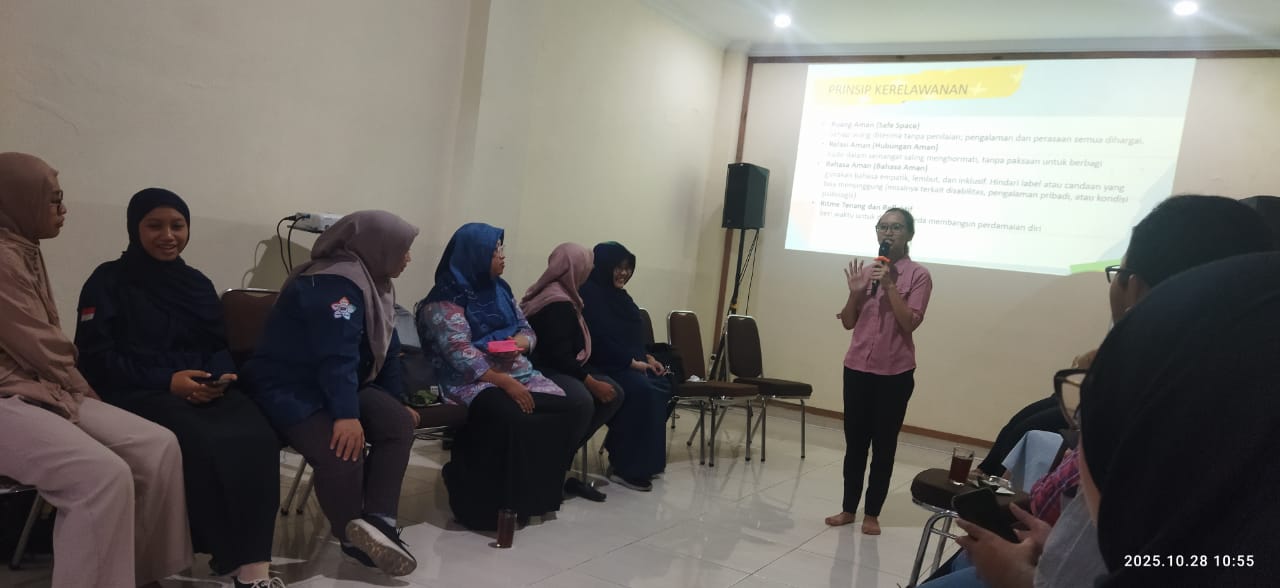Peace within is important for an inclusion volunteer when they are dealing with vulnerable people, such as children, women, and people with disability. Peace within prevents burnout and fatigue, and balance mind and feeling. Mendampingi itu dengan tidak menyerap semua luka dan sebagai pendamping/relawan sangat dihindari terjadinya secondary trauma.
Secondary trauma is an emotional or psychological pressure from indirect exposure to other people’s traumatic experience, i.e. through stories, pictures, or direct witnessing. This situation is different from direct trauma because the former does not involve traumatic personal experience, but emerges from empathy and exposure to other people’s stories or trauma which professionals such as social workers, first aid responders, and health workers’ experience.
“To become a full human, what can be done to friends with disability and victims when volunteers may see themselves as accompaniments. There should be empathy not simply sympathy,” says Dorkas Febria, the facilitator from Yayasan YAPHI during the first session of the third training for inclusion volunteers (Relasi), or relational class conducted by Yayasan YAPHI and Jaringan Visi Solo Inklusi at Anawim Hall, Yayasan YAPHI, on Tuesday (28/10).
"If we do not have self-limit, we may be inundated and get hurt. We often feel and ask ourselves, so we need a clear boundary. We can be fully present, when accompanying people with disability by giving our best," says Dorkas.
If an incllusion volunteer enters a situation of not being at peace within and continuously blame themselves, they feel that they do not fit, they get angry, frustrated easily, have vengeance, difficult to focus, difficult to sleep when accompanying, anxious, feeling tired and telling about the experience of victims of violence, and dreaming it, and wakes up not feeling fresh but tired. When we do not draw a line, we will continuously feel tired.
Dorkas then says about the need for a safe space, that every person must be accepted without any judgment, and that experience and feelings must be appreciated. The safe space means safe people, safe facilities, and safe activities. Safe relation means free of power relations, and be present and full of mutual respect without coercion to share as people are equal. Even language should also be safe, free of stigma and sexist tendency.
"I change my perspective right away, when I get the knowledge about peace within, " says Adnan.
In addition to peace within, the first session of the training urges the 22 participants to practice mindfulness through silence with Vera. Vera asks participants to meditate and return to their own awareness.
A participant of relational class, Adnansays during a discussion session that he gets a lot of benefits from learning about volunteerism. He has made himself available to become a volunteer that listens through social media. He tells his experience of accompanying a person who wants to self-hurt. Adnan then diver the attention of the person and listens to the person’s stories.
Adnan says that by learning peace within, he could shift his perspective – changing his paradigm that volunteer should know their limits and other things that he needs to learn. Then he makes more time available to prepare himself. "I need a lot of energy to be able to respond to each and every issue one by one and I am ready to become a volunteer, " says Adnan. (Renny Talitha/Ast)












